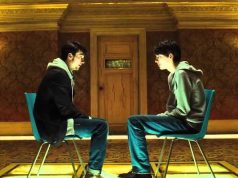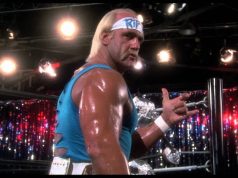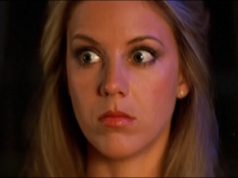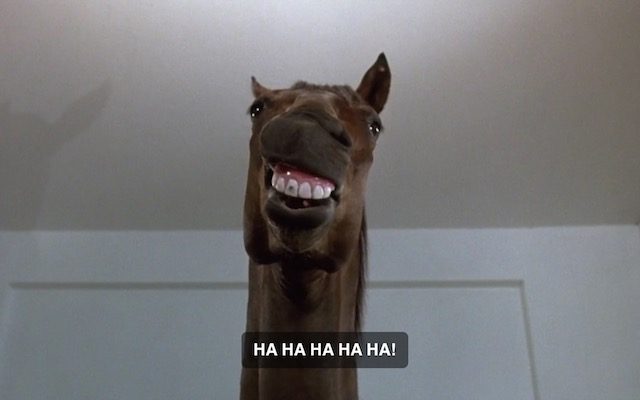
John Candy did a lot of funny things in his life, like “Planes, Trains and Automobiles” and “Uncle Buck,” in addition to the many sad and tragic things he did, like “Nothing But Trouble” and dying. But one particularly pungent offense on the spherical Canadian’s rap sheet is “Hot to Trot,” in which Bobcat Goldthwait owns a talking horse, and John Candy is the voice of that horse.
When word of this film’s existence reached my ears, my initial reaction was skepticism. A guy with a talking horse? Please. The back alleys of my memory are littered with the decaying corpses of hundreds, if not thousands, of forgotten movies about talking horses. The only way I’m going to add “Hot to Trot” to the pile is if the talking horse ALSO gives his owner stock tips. I demand variety.
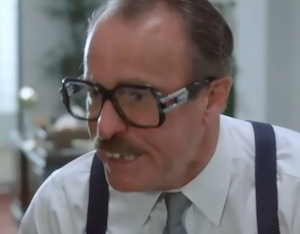
Well, shut my mouth, because that’s exactly what the horse in “Hot to Trot” does! His name is Don, and he is one of two possessions bequeathed by a dead lady to her idiot son, Fred (Goldthwait), the other being half ownership of a brokerage firm. Fred doesn’t want a horse and is too stupid to work in finance — he kind of got shafted, inheritance-wise — but he chooses to stay on as half-owner sheerly to spite the other half-owner, his jerky stepfather, Walter. Walter is played by Dabney Coleman, who is wearing, for no discernible reason, giant fake comedy teeth. Since the character’s teeth are never mentioned and do not serve any story-related purpose, we are forced to conclude that Coleman wore them solely to avoid being recognized.
So here’s a snaggle-toothed S.O.B. and a stringy-haired cretin who hate each other running a brokerage firm together, one motivated by greed and the other spite. Such an arrangement seems destined for failure (though people said the same thing about Tom Cruise and Katie Holmes, and they turned out fine). And indeed, Fred’s complete ignorance of even the most rudimentary elements of running a brokerage firm would seem a dismal portent, were it not for the narrative device known to the Greeks as equus ex machina.
Fred has already met Don the talking horse at this point. They met in the stables, and as is customary in these movies, Fred was shocked by the idea of a talking horse for about five seconds, then immediately got used to it. Now, in his moment of distress, Fred receives a phone call from Don urging him to invest heavily in some little-known company that’s about to get huge. Don knows this because he overheard a rich dude talking about it at the stables, and he immediately used the opposable thumbs and dexterous fingers that all horses have to dial the phone and tell Fred.
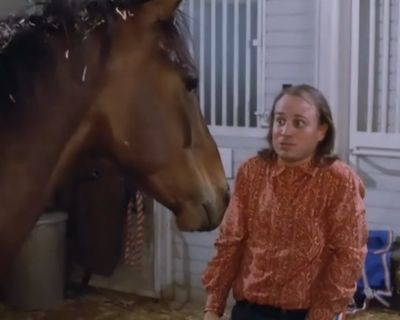
Perhaps you are thinking that no matter how dumb Fred is, he would never take stock advice from a horse. The movie is a step ahead of you. Don doesn’t identify himself when he calls, and Fred doesn’t recognize his voice. So when Fred takes the stock advice, he doesn’t think it’s coming from the talking horse his mother left him; he thinks it’s coming from an anonymous stranger. Give the guy some credit.
The tip proves correct, and Fred is instantly rich. He moves into a luxury apartment, then is guilted by Don into letting Don live there, too. No reason is given for Don’s desire to dwell in a place that is 100 percent unsuited for equine residents, nor can I imagine one. It has already been established that Don has a comfortable life among other horses, all his needs amply met, with soft straw to lie upon and abundance places to defecate. Yet suddenly one day he’s trotting down a city street, as if he were homeless, sees Fred’s picture in the newspaper, and shows up on his doorstep wanting to be his roommate.
It’s like the filmmakers thought it would be funny if a man shared an apartment with a horse, but they couldn’t think of a good reason for that to happen, so they just made it happen anyway, and then it wasn’t funny after all.
Fred is flustered by the sudden arrival of his talking horse (who, it should be noted, does not have a job and will not be able to help with the rent). The talking horse went from a novelty to a nuisance in record time, even faster than Russell Brand did. Oh, the hilarious shenanigans Fred and Don have! In another movie, I mean, an imaginary one, one that’s like “Hot to Trot” but with comedy. In this one, Don just throws a wild party attended by other animals — including dogs, geese, a pig, and another horse, don’t ask me where they came from — who trash the place and, yes, do refer to themselves as “party animals,” in case you were wondering.
Let us devote a few words to the things uttered by Don the magical talking horse. According to Hollywood lore, John Candy was a last-minute addition to the film, brought in after disastrous test screenings — which had Elliott Gould as Don’s voice — caused audience members to weep openly and question the existence of God. The idea was to have Candy provide not only a new voice but new, funnier things for Don to say.
Instead, Candy ad-libbed a stream of limp one-liners in his usual cheerful manner, punctuating most of them with a “heh heh” laugh. As portrayed by Candy, Don is the sort of talking horse who laughs at his own jokes, which are terrible. Sometimes they’re not even really jokes, yet Don laughs anyway.
For example, when he tells Fred how many other animal languages he speaks: “You might say I’m a four-legged Dr. Dolittle! Heh heh!”
Or when he describes his upbringing on a farm: “I was restless — wild, I guess you could call it. A lot like James Dean, except I slept standing up! Heh heh!”
Or when he uses his dark powers as a speech-enabled beast of burden to summon the malevolent lord Satan to rain fire and anguish upon the Earth’s inhabitants: “Time for the apocalypse — or should I say, clippety-clop-alypse! Heh heh!”
Just kidding, I made that one up, as an example of the sort of thing I would make up if I found a comedy profoundly irritating and wished to subject its tropes to ridicule.
In addition to John Candy’s pitiful snarking, the film suffers from the casting of Bobcast Goldthwait as the lead. Goldthwait is a creative and well-respected writer-director today, but in 1988 he was still using that whiny-shouty-breaky voice that he used to do in his stand-up, as it had not yet been banned by the United Nations. Ninety minutes of that is bad enough on its own; when it’s in tandem with a chatty, self-amused horse that speaks only in rejected Billy Crystal gags, it’s enough to make us rethink the wisdom of adding sound to motion pictures in the first place.
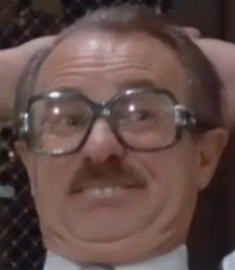
But “Hot to Trot” is not just a movie about a talking horse who gives stock tips. You wouldn’t be able to get very far with that premise, not in today’s economy, not with today’s horses. Don’s second tip is for Fred to urge clients to buy stock in the company that makes the brand of oats he (Don) loves to eat. Don’s reasoning is that since this product is delicious, the manufacturer is surely about to become a major player in the industry, what with so many people who invest in the stock market relying so heavily upon the dietary preferences of their horses. This logic fails, however, and the company goes belly-up, and now Fred is flat broke.
The only way for Fred to regain his fortune — you have no doubt already arrived at this conclusion — is for Don to run in a race and win the prize money. Don isn’t really a “race horse” so much as a lazy horse that lives in an apartment with a bumbling financier. But Fred isn’t really a “jockey,” either, so much as a person who is the opposite of a jockey, and he does just fine riding Don to victory. Somehow the win is bad news for Comedy-Teeth Walter, I forget how, and so everyone who deserves to live happily ever gets to live happily ever after. No way is Fred getting the security deposit back on that apartment, though.
(P.S. This film has three credited screenwriters, and one of them is named Stephen Neigher. You would think that neither of those things could possibly be true, and yet both are.)
— Film.com


